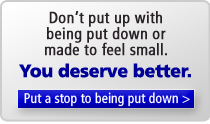QA: My Manager Has Stripped My Confidence
 “I’ve been struggling with one of my managers since my first day on the job.”
“I’ve been struggling with one of my managers since my first day on the job.”
In high school and college I used to feel like I had a lot of confidence in myself and my abilities. But somehow I feel like this job has just stripped me of it over the past year. I’ve become quite, timid and no longer voice my opinion, etc. because this manager is so condescending and micro-manages everything. She talks down to me and my self-worth has really taken a beating from it.
I talked with her superior a few months ago, and things got better only temporarily. I’d love to get a new job, but a recession is definitely a hard time to do that and I feel stuck with having to make due for a bit until things pick up. If so, I need to figure out how to survive here. ” – C in Georgia
I hate it when I hear about situations like yours C, because it means there are still so many ‘managers’ out there who have no clue how to manage. Just imagine how different things would be across the world if every one of those managers was either taught how to get the best from people or if they were replaced with someone who really ‘gets it’.
Anyway, me ranting about that won’t help you right now. A couple of thoughts for you:
1. Don’t forget how you used to feel. That confidence is still there, you’ve simply learned a pattern of behaviour where you don’t exhibit it because you’re not seeing the results or getting the feedback you’d expect. Look at where you do feel that confidence today and how it feels – you have to keep that close to you and keep connected to it.
The fact that your manager talks down to you and makes you feel small, doesn’t mean that you are small.
Not one bit. A lot of managers are scared silly (particularly in today’s climate), and they use strategies like condescension and micro-managing as a way of maintaining control and status. That doesn’t make it the ‘truth’, it just makes it something that happens near you.
2. Yes, a recession is a tough time to find work, but that doesn’t mean it’s not out there. You don’t say what it is you do, but it does absolutely no harm to start looking.
The best way to get a job these days is through people you know, not through ads in the paper or even job boards.
I think LinkedIn is a great tool for doing that, and I’ve got roles from it just by connecting with people and having people find me there. You can use LinkedIn to research people in your field, to reach out to HR people in the organisations you’d love to get into and it also has job postings that never make it onto job boards. The reason it works is that it’s a network based on trust and recommendation – and that’s worth its weight in gold.
But don’t forget the power of connecting with people offline too. Who are 10 people you can have an interesting conversation with about your next move? How else can you research what’s out there?
There are opportunities out there, so catch yourself when you say you’re stuck. It might feel like that sometimes, but I guarantee you always have choices.
3. Okay, now it gets tricker. Can you talk directly with your line manager? A managers job is to create an environment where their staff can do great work – and you’re entitled to flag up where that could happen better.
Don’t criticise, simply state what would allow you to do better work, and give evidence of your work to support your position. “How I’d love to do this is…“, “I fully understand that you want to get the right result, I really need to do it like this and I’ll keep you in the loop all the way.”
Don’t try to squeeze this conversation in as you pass each other in the corridor, grab lunch together or go for a coffee, sit down and talk like adults. You always have recourse to go back to their manager if it comes to that.
If it comes right down to it and there’s nowhere else for you to turn, you owe it to yourself to get outa there.
You don’t have to tolerate bad management, and you have to put your own wellbeing first.
You know, the chances are that a move will help your career too.
4. One last thought for you. I’ve found that it becomes more stressful and more damaging when I resist what I’m doing. All the time I struggle and fight it, it hurts. When I make a deliberate choice to throw myself in and do my best work, it becomes so much easier.
Look for the parts you’re resisting and make a choice to engage.
That doesn’t mean you have to forget about what you want to see happen or that you have to put off a job search, it just means you’re making your experience more fun and more valuable while you’re there.
- Other articles you might like:
- How to get confident as a new Manager
- Jelly Beans Stopped my Head Exploding
- Get confident enough to stop controlling everything
 My head nearly exploded recently. It wasn’t pretty.
My head nearly exploded recently. It wasn’t pretty.



 So here it, Silly Season.
So here it, Silly Season. You need an exit strategy for 2 reasons. Firstly if you’re stuck in a conversational cul-de-sac that’s making you squirm, you’re allowed to excuse yourself and move on. Say you’re going to top up your drink, off to visit the bathroom or off to mingle.
You need an exit strategy for 2 reasons. Firstly if you’re stuck in a conversational cul-de-sac that’s making you squirm, you’re allowed to excuse yourself and move on. Say you’re going to top up your drink, off to visit the bathroom or off to mingle. I once had a boss who I’m sure was insane. I don’t mean to be insulting (although I’m probably being just that), but nothing else could explain her madly erratic behaviour, lack of judgement in making decisions and complete loss of memory when her decisions turned out to be the wrong ones. ‘Why didn’t you do that?’ she’d ask me when things blew up. ‘Because when I mentioned I was going to do it you explicitly told me not to and to do this instead’, I answered.
I once had a boss who I’m sure was insane. I don’t mean to be insulting (although I’m probably being just that), but nothing else could explain her madly erratic behaviour, lack of judgement in making decisions and complete loss of memory when her decisions turned out to be the wrong ones. ‘Why didn’t you do that?’ she’d ask me when things blew up. ‘Because when I mentioned I was going to do it you explicitly told me not to and to do this instead’, I answered. Of course, those strategies are moot if your boss hasn’t given you the opportunity to establish them and if there are no clear signs that those opportunities are coming. That really sucks, because a managers job is to create an environment where you can do great work. If they’re not doing that they’re simply making things more difficult and getting in the way of their empoyee’s future – I sometimes call these kinds of people ‘negative swimmers’.
Of course, those strategies are moot if your boss hasn’t given you the opportunity to establish them and if there are no clear signs that those opportunities are coming. That really sucks, because a managers job is to create an environment where you can do great work. If they’re not doing that they’re simply making things more difficult and getting in the way of their empoyee’s future – I sometimes call these kinds of people ‘negative swimmers’.
 When people get together for an extended period of time, groups will form. It happens naturally, something left over from the tribe instinct that we mammals still have. I’ll bet that there are groups in your organisation or even within your friends, groups that you may or may not be a part of.
When people get together for an extended period of time, groups will form. It happens naturally, something left over from the tribe instinct that we mammals still have. I’ll bet that there are groups in your organisation or even within your friends, groups that you may or may not be a part of. That’s me when I was around 4 years old (funnily enough I have a very similar polo shirt that I wear now!). Of course, at that age I had no idea what was in store for me, and just a couple of years later when I was around 6 years old I remember being asked by my primary school teacher what I wanted to be when I grew up. I reflected for a moment and torn between two options I said ‘I’m not sure. Either an artist or an inventor.’
That’s me when I was around 4 years old (funnily enough I have a very similar polo shirt that I wear now!). Of course, at that age I had no idea what was in store for me, and just a couple of years later when I was around 6 years old I remember being asked by my primary school teacher what I wanted to be when I grew up. I reflected for a moment and torn between two options I said ‘I’m not sure. Either an artist or an inventor.’